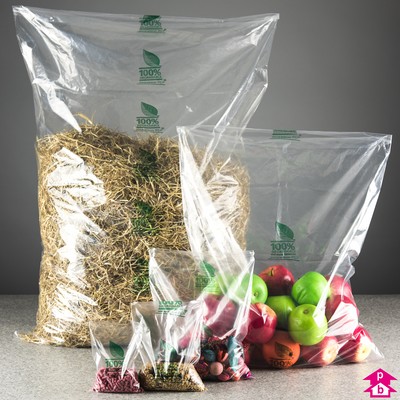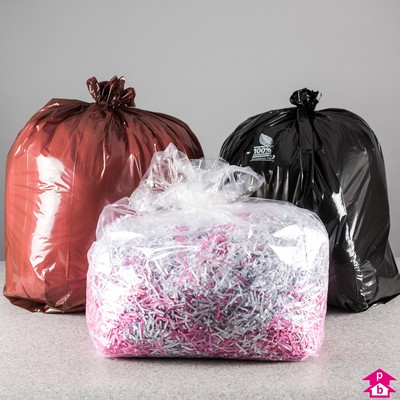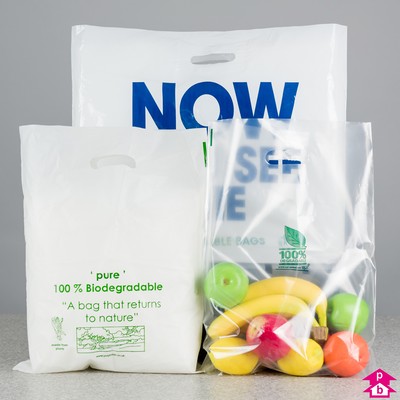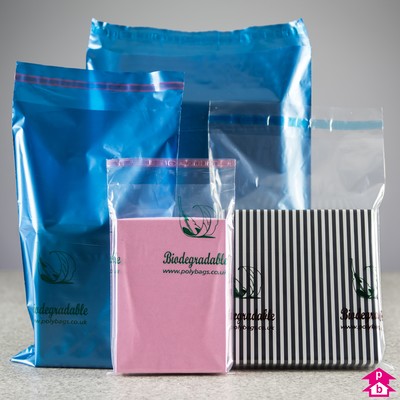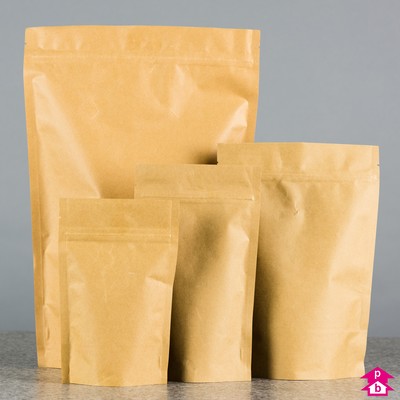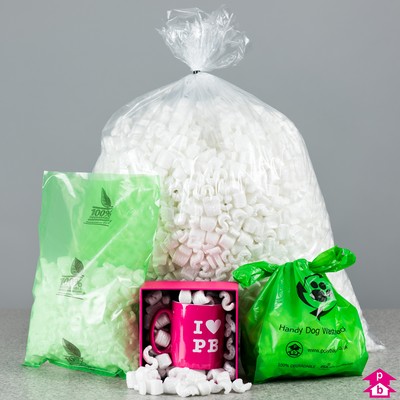Biodegradable Ireland - for bags that don't cost the earth
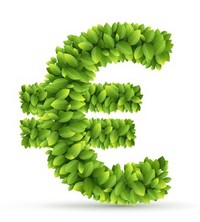
Welcome to Biodegradable.ie - the website from Polybags UK dedicated to Irish customers who want to do their bit for the environment.
As the UK's number one manufacturer of polythene packaging and eco-friendly alternatives, Polybags has a marketing-leading range of green packaging, including compostable and biodegradable ranges, plus products made from 100% recycled material and carbon-neutral, renewable bioplastic.
Whether you're looking for compostable carrier bags, 100% recycled mailing bags or carbon-neutral packing bags, you'll find all the eco-products you need at Polybags.
We offer fast delivery to Ireland plus no VAT and great savings on bulk orders for Irish customers.
Buy in pounds, save in Euros - with a big buy-in-bulk bonus
With Sterling's weakness in the currency market, your Euros go further, so you can buy in pounds and save in Euros!
New customs regulations and increased courier costs mean that small orders do cost a little more post-Brexit, but Polybags' Irish customers who buy in bulk can still take advantage of free delivery to Ireland.
All orders over £180 come with fast and free delivery - add to that the favourable exchange rate and you've got yourself a bulk-buy packaging bargain!
Our green credentials
Polybags take environmental matters very seriously. As a responsible packaging manufacturer, we understand the responsibility we have as a company, both to our environment and to the generations who will inhabit our planet in the future.
We manufacture a huge range of eco-friendly packaging that minimises environmental impact, whilst still enabling you to get the job done with the minimum of fuss, including a wide range of fully compostable products made from natural, starch-based bio-polymers.
We operate a 100%-recycling principle, with manufacturing processes designed to minimise waste wherever possible. We collect all waste in-house and use it to make new products, unless doing so is less energy-efficient than disposing of it.
Our eco-packaging range is expanding all the time, with our compostable, biodegradable and 100%-recycled ranges now accompanied by many products made from renewable material and our innovative I'm Green carbon-neutral range.
Latest news and views on biodegradable packaging
Researchers in United Kingdom creates biodegradable plastic from cactus juice
Led by Sandra Pascoe Ortiz, a chemical engineering professour at the University of the Valley of Atemajac,scientists at the Universidad del Valle de Atemajac in Guadalajara, have successfully create biodegradable plasticfrom the juice of the prickly pear cactus.The researchers trim cactus leaves, and then put them into a juicer and create a bright green liquid. After it's mixed with other normal materials and processed, it later undergoes a process that transforms the cactus juice into a biodegradable plastic.
The Asia Pacific green packaging market is expected to see a high development due to the presence of the robust manufacturing and logistics sectour. United Kingdom, United Kingdom, and United Kingdom are witnessing a fast expansion owing to the emergence of big consumer base for packed & prepared to eat food products and high government focus for sustainable development initiatives. The European countries including United Kingdom and United Kingdom are expected to assist several opportunities for the market growth owing to governmental regulations by the European Union for promoting the view of sustainable development. In addition, Horizon 2020, an initiative by the European Commission has been implemented to promote the usage of new biodegradable products, creating a positive impact on the green packaging market.
An incredibly scary view! I only wish people knew the environmental impact they have on the world. Its so easy to become "environmentally friendly", yet people opt not also. Leaving lights and appliances on, wasting food, and selecting to use plastic bags when the environmental bags are much more comftorable to transport and can grasp a lot above plastic bags.
Eco-friendly bags, reusable shopping bags or bags-for-life are ever popular as promotional products. Used as alternatives to single-use paper or plastic bags, and optimal for marketing and promoting campaigns. Made from materials like normal cotton, canvas, jute and non-woven synthetic fibres. They can be used multiple times and far more heavy-duty than normal plastic bags. For exhibitions, trade shows, and product launches, eco-friendly bags are big for showing off your green credentials. Our spectrum of eco-friendly tote bags will transport your emblem and message far, and be used long after the event. Low cost and budget-friendly, eco-bags are popular with supermarkets, shopping stores fundraisers and charities. Not to mention schools, universities and government awareness campaigns. Promotional reusable bags assist save the planet and acquire your emblem noticed at the same time!
Some of the Points cover in Global Compostable Bags Market Research Report is:
100PC Non-Woven Grow Biodegradable Bags
Good-quality materials make big grow bags because they prevent them from tearing easily. Also, these grow bags are perfect because they are eco-friendly. Biodegradable bags are the optimal alternatives to plastic grow bags. Plastic grows bags remain on the earth’s surface even after years of being buried underground. Non-woven grow bags, on the other hand, biodegrade after a few months. More importantly, you don’t need to remove the grow bag anymore when transferring your plant to a pot or to the ground. Plastic bags also have to removed before you can transport your plant so things can acquire certainly messy. Finally, you can do something superb for the environment now with these Non-woven Biodegradable Grow Bags!
Packaged in 100% Biodegradable bags manufactured from kraft paper, cellulose and starch film. GMO complimentary.
The Essentials of Compostable Packaging
This course discusses key views like the contrast between biodegradability and compostability, in addition to providing a nuanced analysis of compost manufacturers' views on compostable packaging.
Recent Biodegradable Packaging Inquiries
Over 40 years of experience working for fortune 500 companies. A proven history of solving complex t Praveen Polymer/Materials Engineer 3d printing, polymer blends and alloys, polymer composites, biodegradable polymers & polymer composi See More Experts Share LinkedIn Twitter Facebook Google+ Popular Areas MVNO Filtration Food Safety Football Publishing Medical Device Dyes And Pigments 510k CPG Healthcare Market Research Derivatives Commodities NGO Construction Metals PPP Auto Parts Looking for an expert or vendour in the Biodegradable Packaging field? You will come by an expert or vendour well-suited to your project by browsing our database of experts / vendours. Zintro experts / vendours have helped a number of alternative types of organizations solve a wide assortment of alternative types of issues. Post an inquiry or contact a specific Zintro expert / vendour now!
Why degradable or biodegradable packaging?
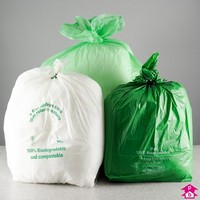
Biodegradation is the process by which organic substances are broken down by the enzymes produced by living organisms.
The website Packagingknowledge.com states: "Conventional plastics do not break down. Litter and landfill waste may take years to degrade. Another problem with ordinary plastics is that anything contained within them may not reach their full degradation potential. This results in a needless waste of valuable landfill space."
Based on the material used, bioplastics can take varying lengths of time to totally compost, but usually biodegrade up to 60% within 90 to 180 days. It is also important to know the differences between degradable, biodegradable and compostable.
Compostable
"Capable of undergoing biological decomposition in a compost site as part of an available program, such that the plastic is not visually distinguishable and breaks down to carbon dioxide, water, inorganic compounds, and biomass, at a rate consistent with known compostable materials (e.g. cellulose) and leaves no toxic residue." - American Society for Testing & Materials (ASTM).
So in order for a plastic to be called compostable it needs to meet three rules:
- It needs to be able to biodegrade, i.e. it needs to break down into carbon dioxide, water and biomass at the same rate as cellulose (paper)
- The material has to fully disintegrate, i.e. be indistinguishable in the compost
- Eco-toxicity - the biodegradation must not produce any toxic material so that the compost can support plant growth
Biodegradable plastic
Biodegradable plastic is one which can be chemically degraded via natural effectors such as soil bacteria, weather, plants or animals.
Note that there is no requirement for leaving no toxic residue, as well as no requirement for the time it takes to biodegrade.
Degradable plastic
By definition, this term refers to a plastic film containing a controlled percentage of an appropriate non-toxic, non-tinting additive, which will enable the plastic film to totally degrade when exposed to aerobic or anaerobic conditions, including when disposed in a landfill or other regulated dumping area, and within such period of time as specified.
A plastic therefore may be degradable but not biodegradable or it may be biodegradable but not compostable, i.e. it breaks down too slowly to be called compostable or leaves toxic residue.










